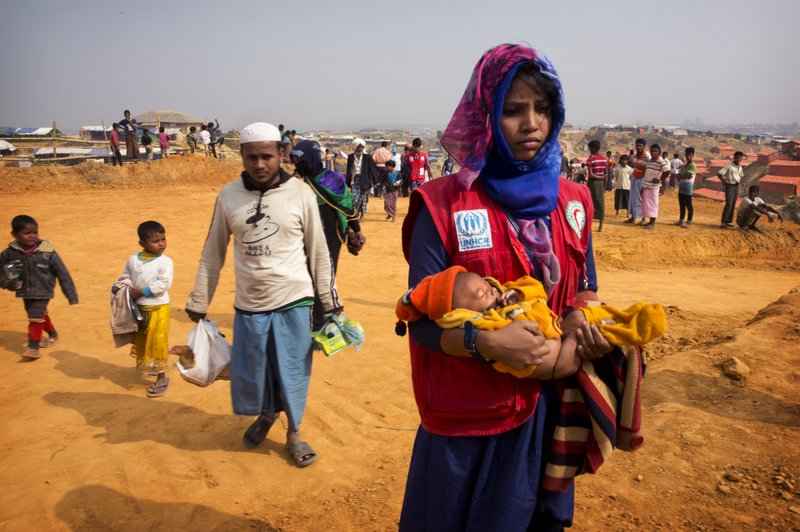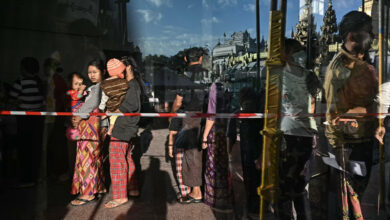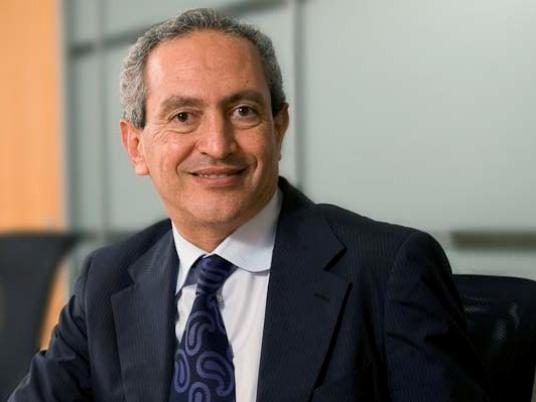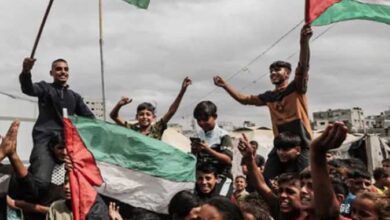
US Ambassador Nikki Haley denounced Myanmar’s government Tuesday for continuing to make life for Rohingya Muslims “a death sentence,” citing the reporting of mass graves by The Associated Press and other news organizations.
She started her speech to the Security Council by recounting how a Rohingya refugee in Bangladesh, Noor Kadir, told AP about surviving an attack by soldiers on 14 friends trying to choose sides for a local soccer-like game in the village of Gu Dar Pyin in Myanmar’s Rakhine state.
Haley said only Kadir and two friends survived, and six days later he found teammates partially buried in mass graves — reportedly among five mass graves. Survivors reported that more than 200 soldiers descended on the village, shooting and burning homes, she said.
Myanmar’s government “regularly denies the existence of massacres and mass graves and claims to be fighting ’terrorists,’” Haley said. “But what Kadir found that day indicated that the military knew what it was doing was wrong and didn’t want the world to know.”
She also cited evidence of “another massacre and mass grave” in the fishing village of Inn Din, discovered by two Reuters reporters who are now imprisoned.
Haley said they reported that police ordered villagers “to participate in the killing, dismemberment and burial in a mass grave of 10 Rohingya men and boys.” She called for the reporters’ immediate release, saying “unhindered media access is vitally important.”
During the council meeting, many countries including Britain, Netherlands, France, Kazakhstan and Sweden raised the reports of mass graves and the imprisoned journalists.
“Numerous reports of systematic widespread and coordinated acts of violence strongly indicate that crimes against humanity have been committed in Rakhine,” said Sweden’s deputy UN Ambassador, Carl Skau.
Buddhist-majority Myanmar doesn’t recognize the Rohingya as an ethnic group, insisting they are Bengali migrants from Bangladesh living illegally in the country. It has denied them citizenship, leaving them stateless.
The recent spasm of violence began when Rohingya insurgents staged a series of attacks August 25. Myanmar security forces then began a scorched-earth campaign against Rohingya villages that the UN and human rights groups have called a campaign of ethnic cleansing.
Myanmar Ambassador Hau Do Suan told the council that AP and BBC reports of mass graves in Gu Dar Pyin were investigated by a 17-member team. He said that “no mass grave was found” and that village elders “confirmed there were no such incidents,” but the state government “is extending the investigation to nearby villages.”
As for the mass grave in Inn Din, Suan said the military’s investigation found that 10 members of the Arakan Rohingya Salvation Army — the Rohingya insurgent group that carried out attacks on security forces August 25 — were arrested September 1. He said the next day they were executed and buried.
Suan said 16 people including army and police officers and some villagers are facing unspecified “action” for violating “standard operating procedures and rules of engagement.”
Haley said powerful forces in Myanmar’s government have denied ethnic cleansing in Rakhine, and “to make sure no one contradicts their preposterous denials, they are preventing access to Rakhine to anyone or any organization that might bear witness to their atrocities, including the UN Security Council.”
She posed a challenge for Myanmar’s leader, Aung San Suu Kyi, the Nobel laureate celebrated in the past “for her commitment to peace and her fellow man.”
“If any of that love of humanity can be found in the government,” Haley said, the least it can do is allow humanitarian groups to get “food to the starving, medical care to the wounded, and psychological services to the sexually abused” Rohingya still in Rakhine state.




